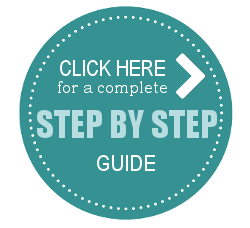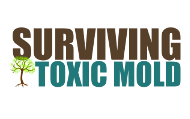You're Having Anxiety, Nervousness, OCD, Racing Thoughts and even
Severe Panic Attacks
IT COULD BE TOXIC MOLD EXPOSURE
Your breath becomes shallow, your heart starts beating extremely fast and hard, you start getting dizzy, your throat starts closing in on you, you are constantly nervous, you are extremely bothered by everything not being in order or perfectly lined up or the way it should be, your thoughts are running so fast you can't even stop your own brain from thinking.

This was my "FIRST SYMPTOM" of mold exposure back in 2011. I was having a particularly stressed month with my marketing business, and one of the events I had worked on for a Vegas trade show completely failed because the manager didn't follow through with the marketing strategy I had spent 2 months working on for their company. After the devastating call from another work associate letting me know that the manager had failed to follow through, it was about 2 hours of me devastated sitting at my desk when all of a sudden my head started spinning, I fell out of my office chair and collapsed on the floor with what I thought was the END OF MY LIFE.
How can toxic mold exposure be related to Anxiety and Panic Attacks?
Exposure to toxic molds, particularly molds that produce mycotoxins (e.g., Stachybotrys chartarum, also known as black mold), can have various effects on physical and mental health. While the direct link between mold exposure and anxiety or panic attacks is still an area of research, several mechanisms may contribute to this connection:
1. Neuroinflammation and Neurotoxicity
- Mycotoxins produced by toxic molds can cause inflammation in the body and potentially the brain (neuroinflammation). This inflammation may disrupt normal brain function, including areas that regulate mood and anxiety.
- Mycotoxins can also interfere with neurotransmitter systems, such as serotonin, dopamine, and GABA, which play crucial roles in mood regulation and anxiety control.
2. Immune System Activation
- Mold exposure can activate the immune system, leading to the release of inflammatory cytokines. These cytokines can cross the blood-brain barrier and affect brain function, potentially triggering anxiety-like symptoms.
- Chronic immune activation due to ongoing mold exposure can worsen mental health over time.
3. Hypersensitivity Reactions
- Some individuals are particularly sensitive to mold and may experience severe allergic or hypersensitivity reactions. The physical symptoms, such as shortness of breath, dizziness, and heart palpitations, can mimic or trigger panic attacks.
-
Mast Cell Activation
(MCA) refers to the process by which mast cells, a type of immune cell, are triggered to release their contents in response to various stimuli. These cells play a crucial role in the immune system, particularly in allergic reactions, inflammation, and defense against pathogens.
When activated, mast cells release various substances stored in their granules, including:
- Histamine: Causes inflammation, itching, and increased blood vessel permeability.
- Cytokines: Promote immune signaling and inflammation.
- Leukotrienes and Prostaglandins: Contribute to inflammation and allergic responses.
- Enzymes and Other Molecules: Help recruit other immune cells and break down pathogens.
MCAS can occur in normal physiological contexts (e.g., to defend against infections) or abnormally in certain conditions.
Triggers of Mast Cell Activation
Mast cells can be activated by a wide range of stimuli, including:
- Allergens (e.g., pollen, dust, foods).
- Infections (bacterial, viral, parasitic).
- Physical triggers (heat, cold, friction).
- Stress (emotional or physical).
- Chemicals (e.g., certain medications, fragrances).
- Toxins, including mycotoxins from mold.
4. Endocrine Disruption
- Mycotoxins may disrupt the hypothalamic-pituitary-adrenal (HPA) axis, which regulates the body's stress response. Dysregulation of the HPA axis can increase susceptibility to anxiety and panic attacks.
- Mycotoxins produced by indoor molds can also "Mimic" estrogen receptors. This means it can cause an increase or decrease in estrogen production which can cause a severe hormonal imbalance between testosterone, progesterone and estrogen leading to estrogen dominance. This imbalance can be a cause of anxiety and panic attacks.
5. Psychological Stress
- The experience of living in a mold-contaminated environment can create psychological stress. For example, concerns about health, financial strain from remediation efforts, or fear of mold exposure itself can contribute to heightened anxiety.
6. Impact on Respiratory Health
- Mold exposure can cause respiratory issues such as asthma, wheezing, and shortness of breath. These symptoms can be alarming and may trigger panic attacks in individuals prone to anxiety or those who misinterpret them as signs of a more severe health problem.
7. Toxic Mold and Oxidative Stress
- Mycotoxins can induce oxidative stress in the body, which may affect brain health. Oxidative stress has been linked to various mood disorders, including anxiety.
The stress of dealing with these physical symptoms can lead to anxiety over time.
What to Do if You Suspect Mold-Related Anxiety:
If you suspect that mold exposure is affecting your mental health:
- Address mold as the possible source: Remove or remediate mold from your environment. This may require professional help.
- Seek Medical Evaluation: A doctor, particularly one specializing in environmental or integrative medicine, can assess whether mold exposure is contributing to your symptoms. I found great relief from my anxiety and panic symptoms through "Homeopathy". Find a good homeopathic practitioner near you.
- Support Your Health:
- Consider detoxification protocols under professional supervision.
- Support your immune system with a healthy diet (www.PhazeMoldDiet.com), hydration, and adequate sleep.
- Mental Health Support: Therapy, mindfulness, and stress-management techniques can help manage anxiety and panic attacks during recovery.






